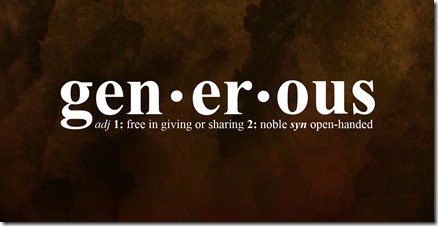 People who learn joyful generosity will experience the generosity of God in greater and unexpected ways.
People who learn joyful generosity will experience the generosity of God in greater and unexpected ways.
One governing life principle of someone who is entering, embracing and engaging a life they were created for is a life of generosity.
Often we focus on what we do not have and that will lead to a belief in scarcity. This in turn steals joy away from our life. At the same time it wars against generosity.
Greed is destructive for community and for our self. It is at the core of our struggle with generosity. Much of the greed has roots in the pursuit of identity, security and significance.
There is some research out now that even suggests that living a generous life can bring greater joy and fullness. .
For Jesus followers, who are people saved by radical grace, we are to live radically generous lives. This is Jesus’ dream for our life and one that brings wholeness, a wholeness both to us and our community.
The gospel of Jesus calls us to a new identity, to trust Jesus for our security and significance. Paul, in Acts 20:35, shares that Jesus said it is more blessed to give than to receive.
Jesus wants us to image a world where those who have help those who do not. Life in the kingdom of God has different value. In following Jesus we understand we are just stewards of resources.
When we live generously, we are declaring God is in control of our environment.
When we live generously, we understand that for those with wealth much is expected.
When we live generously, we understand our life does not consist of our abundance or possessions.
When we live generously, we live by a budget. This allows us to be stewards
When we live generously, we understand it is not just money, but time, and how the things we own are used. How could you use your car to serve others?
Being Generous is something we learn. One step at a time. This week, even this year, what if you gave 1% more then you gave last year.
People who learn joyful generosity will experience the generosity of God in greater and unexpected ways.



